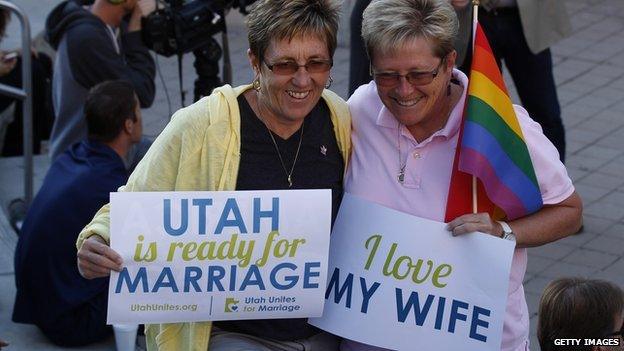Did liberalism win the US culture war?
- Published
- comments

The US Supreme Court's recent non-decision decision to allow multiple lower-court rulings against same-sex marriage bans to stand has led to a spate of articles declaring the Great American Culture War to be over.
Done. Finished. Close books and mark it final. A victory for the forces of liberalism and tolerance - or hedonism and immorality, depending on your political proclivities.
For those not familiar with the history of the US culture war, its unofficial beginning came in 1992, with populist firebrand Patrick Buchanan's Republican National Convention speech, external in which he described a religious war for the soul of America.
"It is a cultural war, as critical to the kind of nation we will one day be as was the Cold War itself," he continued.
He identified abortion, gay rights, religious discrimination and women in US combat forces as among the key battlegrounds on which the war would be fought.
The movement arguably reached its apogee in the early 2000s, with the drive to incorporate gay marriage bans into state constitutions. In 2004 alone voters in 11 states approved such measures.
By 2012, 33 states had adopted gay marriage bans. Then, thanks to successful legal challenges across the country, the legal bulwark religious conservatives had constructed over a decade crumbled and fell.
All that was left was the movement post-mortems and the New York Times editorial, external.
Bill Scher of the Campaign for America's Future offers the liberal take, external on how and why the religious conservative movement seemingly has run aground.
He says conservatives never should have committed themselves so fully and irrevocably on the gay marriage issue. Their efforts alienated young voters without a commensurate increase in turnout from their political base.
"With a little more foresight and a little less bigotry, Republicans could have realized that misguided cultural attitudes toward gays would naturally diminish over time, and divined better ways to rally the conservative troops," he says.
The movement's leaders also abandoned a pragmatic approach to limiting abortion, Scher asserts. Instead of incremental steps, such as prohibiting late-term abortions and parental consent laws, they opted for sweeping "personhood" laws that would ban some forms of contraception and abortion even in the case of rape and incest.
"Perhaps Republicans were impatient with incremental progress," he writes. "Perhaps the party lacked a strong leadership figure who could keep fringe players in check. But Republicans made a decision on abortion strategy that they didn't have to make."

Is Pat Buchanan's culture war over?
Outside the Beltway's James Joyner says, external it's undeniable that abortion and contraception strategies were disastrous for conservatives.
"Essentially, as Northeastern, Midwestern and Western moderates became marginalised in the party, the Southern cultural conservatives took over the issue framing," he writes. "Whereas the former were true conservatives, fighting to preserve traditional cultural norms, the latter were radicals seeking to impose a puritanical set of policies with very little appeal on the country through the legislative process."
On gay marriage, however, Joyner says Scher confuses outcome with cause.
"Being wrong on gay marriage is evidence that Republicans lost the culture wars, not the reason they lost," he writes.
Mary Rice Hasson, writing, external for the website Aleteia, says conservatives shouldn't readily accept defeat. Shifts in public opinion can be transitory, while the principles that undergird their movement - human dignity, value and destiny - are enduring.
"True, American culture does seem to be spiraling towards ever-increasing individualism, utilitarianism, secularism and hedonism, profoundly affecting our relationships with others," she writes. "Self-focused hearts become hardened towards the profoundly disabled or the lonely elderly, disconnected from neighbours and friends, utilitarian towards the human embryos conceived and destroyed during in vitro fertilisation, calloused towards women who become 'breeders' through surrogacy contracts or who become caught up in the sex trade, and indifferent to the loneliness and hardships of immigrants."
The battles may be difficult for her side, she says, "but the real 'war' will never be lost."
Several writers echo Hasson's view of a culture clash that, while different, will endure.
Dick Meyer of Scripps writes, external that while social issues may no longer be at the forefront of today's policy battles, the cultural polarisation that they reflected is still around and exacerbated by today's politicians.
Slate's Rehan Salam identifies, external the debate over religious freedom, embodied in the recent Supreme Court decision to allow employers to opt out of providing insurance that covers some forms of contraception, as a possible central focus of a renewed culture conflict.
"The next culture war could pit devout secularists against a shrinking religious minority determined to live in accordance with their beliefs," he writes.
The abortion issue also isn't going away, he notes, as some states continue to push for a ban on abortion after 20 weeks of pregnancy.
The next big debate could be about reproductive technology that doesn't yet exist, he says, such as artificial wombs and eugenics. Or it could have nothing to do with marriage and sex and instead be a result of the rise of Latino culture in the US.
"Given that the Latino population is poorer than the population at large, we can expect that its members will press for a larger share of public resources at a time when the white and black populations will be aging rapidly," he writes. "It is not at all obvious that non-Latinos will embrace this prospect."
The "culture war" as we know it may be coming to a close. Political conflict, drawn from differing agendas, experiences and priorities, is as old as humankind, however. It's not going anywhere.
- Published7 October 2014